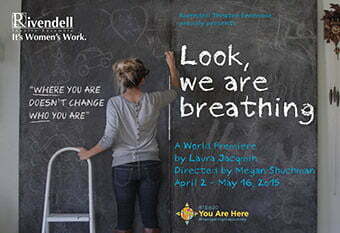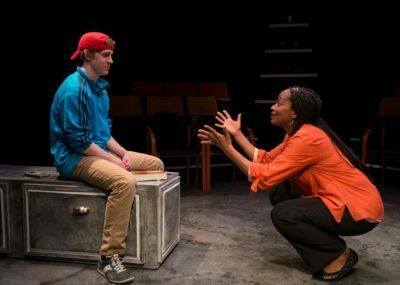Look, We Are Breathing
By Laura Jacqmin
Directed by Megan Shuchman
Produced by Rivendell Theatre Ensemble, Chicago
How Do You Mourn Someone You Didn’t Know?
Grieving is awkward. It’s particularly awkward when you’re in proximity to people who are mourning a mutual acquaintance who they knew well but you didn’t. It’s more awkward still when the deceased or the lead mourner is someone you don’t like, but are supposed to. Look, We Are Breathing, a world premiere play at Rivendell Ensemble Theatre by Chicago playwright Laura Jacqmin explores all those perspectives, in a memory play that tracks the responses of three women to a death that two of them aren’t sure was really a loss.
Mike Hewitt (Brendan Meyer) was a senior in high school and a hockey player. Feckless and indolent, he was a regular partier until one Thursday night in February, after drinking with his teammates, he crashed his father’s car on the way home and died. His mother, Alice (Tara Mallen) recounts to us how she was awakened by police and called to the hospital to identify Mike’s body, which she did, and was conscious of her lack of visceral emotional response. That reminds her of how when he was born, she was assured she would bond with him, and kept waiting for that to happen. Now that her son is dead, she realizes she never loved him.

And that’s not something she blames herself for. Mike could be charming, for people with a certain taste, but at his very worst he occasionally committed impulsive acts of mayhem he was sorry for afterwards, but didn’t learn much from. His AP English teacher, Leticia (Lily Mojekwu) actively disliked him. A black woman with an MA from Dartmouth, she came to the Hewitts’ wealthy suburb intending to teach white kids about their privilege. Mike had other plans, and what really angers Leticia is that his best friend, Rashawn, was black and laughed at Mike’s politically incorrect jokes. And if Mike was still popular, how much were her students learning from her, really? Following his death, Leticia refuses to adjust Mike’s grade to help create the image decorum demands of him as a promising young man whose life was cut too short, and gets in trouble with the administration.
The third narrator, and the only one who was aware of liking Mike, is his fellow student Caylee (Brenann Stacker). She had a crush on him for years, which he was oblivious to, and only succeeded in hooking up with him an hour before he died. So, while she is glad they got a chance to do that, clumsy and cringe-worthy as their semi-drunken sex was, it would have been nice if he’d had a chance to tell someone they were together now, so his insufferable ex-girlfriend couldn’t dominate the school’s collective mourning. Now, after fantasizing that they were Romeo and Juliet, Caylee fantasizes that she’ll have some sort of moment of binding with Alice, which is equally unlikely.

That’s what the narrators start off, thinking, anyway. The play is the evolution of their thought process, and occurs through recollections of their interactions with Mike and his memory. While not shying away from Mike’s immaturity, Meyer presents us with a basically decent, but unmotivated person with a weakness for pleasure. Other than his not knowing the word “jocund,” Caylee’s recollection of cold-reading Shakespeare in their freshman year English classes was that he was no worse than her, and maybe a little better. Stacker performs Caylee as vulnerable and confused, which Meyer reflects during their scene in a friend’s parents’ bedroom. Leticia presents herself as a figure of hard-earned wisdom and moral authority, but Mojekwu gives subtle warning signs throughout the play that inform us before her explosion that Leticia actually has a lot of unresolved issues that Mike brought to the surface. Their scene makes clear her idea of him as a brute was a lie she told herself because he read her too well. As for Alice, the mother, Mallen’s performance is masterful, and carries the arc of the show. Of course her feelings are more complex than she let on at first, but finding the existing services inadequate for her and Mike’s relationship, she is left to find her own way, and do it with a toughness that is not merely a defense mechanism, but genuine.

Megan Shuchman’s directing in Rivendell’s intimate space allows the actresses to directly address the audience in a conversational manner. For long stretches of the play Mike sits in the center under their and our observation, alone except for Mike Mroch’s simple, flexible set. Each of the women has their own display on the wall, showing plastic cups, plates, or books from which they enter the playing space, first with Mike, and then alone to describe things that happened after he died, in a sort of ritualistic purging. Rivendell is a company devoted to women’s experiences, and what the women in this story have to grapple with is that Mike’s only intimate relationships were with other guys. He was much more afraid of disappointing his father than his mother, and his friend Rashawn, who knew him best, is alienated from both the social grieving process and the narrators. The women are left mourning someone they know they didn’t really understand, creating uncomfortable dissonance between the lie they’re expected to go along with, their limited experiences that hint at the truth, and the truth they’ll never know. Jacqmin has skillfully replicated the process of socially obligatory group mourning, and the discomfort that can arise from feeling conscripted into a Greek chorus. Her speculation on what would happen if the myth was not merely an exaggeration, but a contradiction of person’s character is brave and makes fascinating psychological drama.
Highly Recommended
Jacob Davis
Reviewed April 18, 2015
This show has been Jeff recommended.
For more information, see Look, We Are Breathing’s page on Theatre in Chicago.
Playing at Rivendell Theatre, 5779 N Ridge Ave, Chicago. Tickets are $32-35 with discounts for students, seniors, active military, and veterans; to order, call 773-334-7728 or visit www.RivendellTheatre.org. Performances are Wednesdays-Saturdays at 8:00 pm and Saturdays at 4:00 pm through May 16. Running time is ninety minutes with no intermission.
